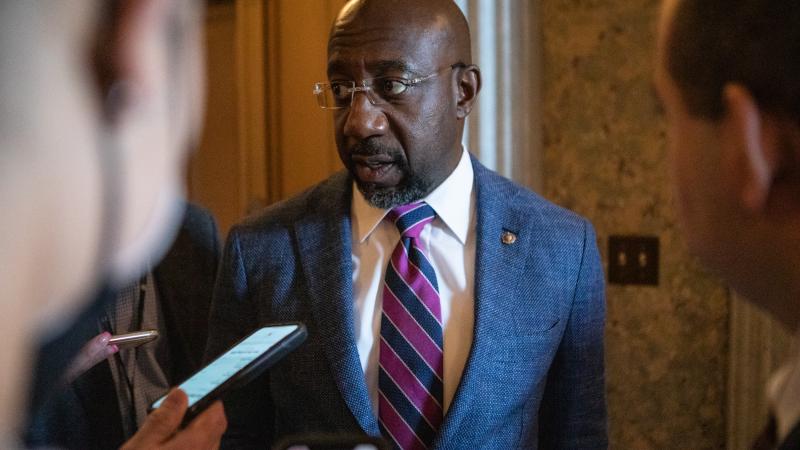Biden wants Iran's IRGC off terror list, 'working overtime' to revive nuke deal, experts warn
Amid reports Iran nuclear talks are on life support, former Trump officials say team Biden still pushing hard, even as congressional opposition mounts.
The Biden administration wants Iran's Islamic Revolutionary Guard Corps (IRGC) off a U.S. government terrorism list and is working hard to revive the Iran nuclear deal despite reports saying the agreement is nearly dead, according to national security experts and former U.S. officials.
Their comments come amid a growing sentiment among observers that talks to revive the deal, which placed temporary curbs on Iran's nuclear program in exchange for lifting billions of dollars' worth of sanctions on Iran, are almost beyond the point of revival.
Former Trump administration officials, however, warn that President Biden and his team have a zealous commitment to the accord, formally known as the Joint Comprehensive Plan of Action (JCPOA), that won't go away easily.
On Wednesday, the White House pressured Senate Democrats to oppose a motion from Sen. James Lankford (R-Okla.) opposing the removal of the IRGC, an Iranian military branch, from the State Department's Foreign Terrorist Organization (FTO) list, according to people familiar with the matter.
"The White House was lobbying Senate Democrats to reject a non-binding motion offered by Sen. Lankford that would put the Senate on record against removing the IRGC from the terrorism list — a stunning indication that the administration has not abandoned its quest for a deal at any cost," said Richard Goldberg, a senior adviser for the Foundation of Defense of Democracies who previously served in the White House National Security Council (NSC) under President Trump.
The White House didn't respond to a request for comment.
Lankford's motion passed 62-33, with the support of several prominent Democrats, such as Sens. Chuck Schumer (N.Y.), Cory Booker (N.J.), Chris Coons (Del.), Richard Blumenthal (Conn.), and Kirsten Gillibrand (N.Y.).
The Biden administration reportedly offered to remove the IRGC from the FTO, a demand made by Iran in talks to revive the nuclear deal, in exchange for Iran committing to de-escalate its aggression across the Middle East and not target Americans.
Last week, Secretary of State Antony Blinken told lawmakers in congressional testimony that the IRGC poses an "ongoing threat" to both current and former U.S. officials.
U.S. officials have discussed delisting all components of the IRGC except for its elite Quds Force, which provides money, weapons, and training to several militias and proxies outside Iran.
Iran rejected the offer, according to Goldberg, because the regime doesn't fear any threat of coercion from the administration.
"It feels comfortable taking a maximal negotiating posture absent any economic sanctions enforcement, political pressure, or threat of military force," he said.
Still, Biden has so far not removed the IRGC from the FTO and indicated he won't moving forward.
However, his stance is motivated by politics, not strategy, according to Fred Fleitz, who served as chief of staff of the NSC under Trump.
"They want the IRGC off the list and sanctions on Iran lifted," said Fleitz, vice chair of the America First Policy Institute Center for American Security. "The Biden administration is only reluctant because it would be so incredibly damaging to them politically. Even Democrats are speaking out against this."
Several Democrats in Congress have called on Biden to keep the IRGC's terrorism designation.
On Wednesday, a strong majority of Senate Democrats joined nearly all their Republican colleagues in voting for a nonbinding motion offered by Sen. Ted Cruz (R-Texas) saying terrorism-related sanctions on Iran are "necessary" to limit cooperation between Iran and China. The motion, which passed 86-12, specifically mentioned imposing sanctions on the IRGC and the Central Bank of Iran.
"The Senate's vote is important," said Goldberg. "President Biden has already offered to lift terrorism sanctions on the Central Bank of Iran. The vote suggests Congress could force those sanctions back on Iran's central bank and upend a nuclear deal."
Whatever their reasons, the Biden team's refusal to remove the IRGC has left talks to revive the deal at an impasse, but that's only part of the story.
"There are several reasons for the current impasse — the most visible is that the Biden administration rightly feels it can't take the IRGC off the FTO list because of the massive domestic backlash that would ensue," said Gabriel Noronha, who served in the Trump administration as a special adviser for Iran at the State Department. "However, we're only in this place where that's a holdup because the Biden administration unilaterally gave up nearly all its economic leverage on Iran over the past year."
Noronha explained that Iran went from a low of $4 billion in accessible foreign exchange reserves at the end of 2020 to over $20 billion in December, a number that's expected to double again this year.
"Biden's refusal to enforce oil sanctions led the Iranians to realize they didn't really need a deal to solve their own domestic issues," he said. "And now they feel empowered to make excessive demands like the removal of IRGC sanctions because they don't care if the deal falls through."
The impasse has led to a growing belief that the accord isn't coming back.
"They are not yanking the IV out of the patient's arm ... but I sense little expectation that there is a positive way forward," one source told Reuters, which described the nuclear deal as "near death," citing U.S. and other Western officials.
Goldberg disagreed, using a similar metaphor to make his point.
"I don't believe the deal is dead — U.S. Special Envoy for Iran Rob Malley [the lead U.S. negotiator] is working overtime to resuscitate the patient," he said.
Noronha argued that Malley, as well as Blinken, engaged in "pure diplomatic negotiation malpractice," which caused three senior diplomats to resign from the negotiating team in protest. He seemed to disagree about the prospects of reviving the deal, describing it as "practically dead." However, because "the State Department team unfortunately lives outside of reality and doesn't realize that because of their missteps," he said, "they still labor under the illusion that everything in the deal can be restored and that harmony will ensue. Those days are long since gone — even the Iranians see that clearly."
Trump withdrew the U.S. from the deal in 2018 — a step decried by the Biden administration as a terrible mistake. When asked about the state of the nuclear talks and why the administration hasn't agreed to finalize a deal if leaving it was so egregious, the State Department referred Just the News to Wednesday's press briefing for the latest on Iran.
"Because a mutual return to compliance with the JCPOA is very much an uncertain proposition, we are now preparing equally for either scenario," State Department spokesperson Ned Price told reporters during the briefing.
Price's comments added to a growing sentiment around Washington, D.C. that the deal may be dead. Others, however, saw nothing to react to.
"Not exactly a headline," tweeted Jason Brodsky, policy director for United Against Nuclear Iran. "The State Department has used this line before — since at least early Decembe. Yet here we still are."
Fleitz noted that the administration and the media have also said repeatedly over the last several months that all parties are close to finalizing a nuclear deal, to the point that such claims have become meaningless.
Fleitz described the nuclear deal as "terrible," saying it was mostly negotiated with Iran by the Chinese and the Russians, who have publicly boasted about the U.S. concessions they solicited in negotiations.
Throughout Biden's time in office, the U.S. and Iran have been negotiating indirectly. The Iranians have refused to meet directly with the U.S. delegation, which has been staying at a separate hotel in Vienna, where the talks have taken place. The European Union has been ferrying documents between each country's negotiators.
Reviving the nuclear deal would be "the nail in the coffin of American credibility," according to Fleitz. "It will make us look that much weaker."
Before talks were stalled, Fleitz said, the administration had been quietly collaborating with the Russians not only to revive the deal but also to undermine future U.S. presidents who might withdraw from it.
He added that the current impasse and reports of the deal being dead show the "best approach is to put maximum pressure on Iran," noting Iran had trouble paying its proxies when Trump was in office and imposed harsh sanctions. "If the deal is finalized, we know what will happen with that windfall of cash Iran will receive."
Goldberg expressed a similar view.
"What we are seeing is a result of abandoning maximum pressure in favor of maximum deference for more than a year," he said. "Iran is enriching uranium at 60% purity and concealing undeclared nuclear activities on a daily basis, all while plotting to kill former U.S. officials, and the regime faces zero consequences."
Former Trump administration Vice President Mike Pence has predicted that even if the nuclear deal is saved, it won't last long.
"I believe that the Republican Party will win control of the House and Senate in 2022, and I believe we'll win back America and the White House in 2024," he said in March.
"Anyone at the negotiating table should understand that come 2025, I believe we will have a Republican president, a Republican administration," Pence continued. "And if the JCPOA finds a way to be resurrected, we will be a part and a voice of a chorus of Americans with that new administration coming into office to end the JCPOA just as quickly as we ended it under the Trump-Pence administration."














